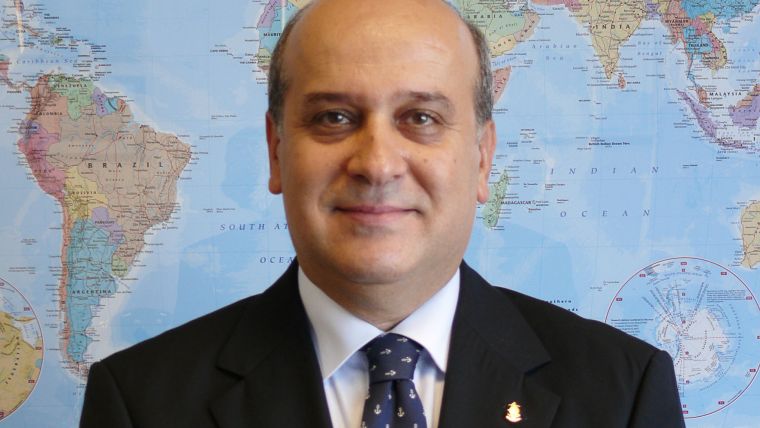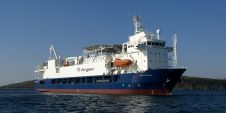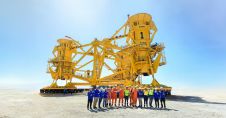5 Questions to Mustafa Iptes
First IHO Assembly to Elect Secretary-General and Directors
During the first IHO Assembly taking place from 24 to 28 April 2017 in Monaco, the represented Member States will elect the new Secretary-General and Directors. The nominees present themselves by answering the same 5 questions. This multi-interview is available at www.hydro-international.com/iho-2017. Rear Admiral (Ret) Mustafa Iptes (Turkey), nominated for Secretary General and Director, answers 5 questions.
Some coastal states are not yet members of the IHO. How do you envisage improving the number of the IHO Member States?
To increase the IHO membership is one of my important priorities and I have a high level of experience on this recruiting policy. I have a goal to reach 100 Member States for the centennial celebrations of the IHO in 2021. I will be proactive and visit decision makers of coastal states that are potential new members and also invite them to become full member of the IHO considering the simple and fast application process under the new IHO structure. I will mainly focus on Significant IMO Flag States that are not a member of the IHO (Panama, Liberia and other big Flag States). The more Member States there are, the better for the prestige and recognition of the IHO and also for the financial status of the organisation to provide Member States with better service.
One of the main objectives of the IHO has, for a number of years, been to foster the hydrographic capabilities of developing countries. How do you envisage continuing and possibly improving the IHO’s actions in this field?
As one of the current directors of the IHO, I have worked particularly hard to promote the IHO Capacity Building (CB) programme which is the strategic objective of the organisation. The CB Programme is the main asset to support the developing countries. I have worked intensively on increasing the level of external CB funds and CB budget. I will continue to improve the level of collaboration and cooperation within CB activities in order to meet training needs of developing states. I wish to enhance the good relationships of the IHO with donor states and funding institutions. I will also encourage and coordinate the large scale regional hydrographic projects which generally include developing states. In addition, I will improve the institutional relationship with global funding organisations, such as the World Bank and UN Agencies.
IHO has established Memorandums of Understanding (MOU) with several other Organisations, Associations and Institutions. In particular, the IHO is a permanent observer of the UNO Assembly. In which way will you coordinate the relations with those entities in order to obtain support in meeting the IHO objectives?
I will concentrate on outreach activities and raising awareness on the importance of hydrography and cartography and the role of the IHO at all international platforms. I will highlight the importance of hydrographic data for Blue Economy activities and encourage other entities for data gathering including crowdsourced bathymetry, and maximising the use of hydrographic data. I will work on improving relationships with relevant international organisations (UN, IMO, IALA, IOC, ISA, WMO, GEO, OGC, etc.) in order to have better cooperation and obtain support based on common interest.
The private industry (PI) participates in oceanographic, hydrographic and cartographic activities with surveys, instruments and software for data analysis and electronic charts production. How would you deal with the PI to optimise its contribution to the IHO?
I believe that private industry participation in the IHO activities is very beneficial for Member States to observe closely the latest technical developments and academic studies. I will encourage the invitation of expert contributors to the relevant technical working groups. Regional Hydrographic Commission meetings and also appropriate platforms in which industry representatives provide valuable contributions to regional capacity building initiatives and also have the opportunity for direct relations with the local hydrographers. I will also support Industry Sessions and informative briefings at relevant IHO meetings and also industry exhibitions in regional and global hydrographic conferences.
Hydrographic data are managed, by the IHO, in a Marine Spatial Data Infrastructure. How do you see their use by the general public beyond their use for ENCs?
Marine Spatial Data Infrastructures (MSDI) is the future of the hydrographic community. Currently, there is lack of awareness of the importance of MSDI in general. Some Hydrographic Offices are aware of this implementation, but many Hydrographic Offices are growing very slowly. I think MSDI activities should be emphasised at all platforms and collected data should be used for multiple purposes in addition to chart production. In this regard, the collect data once, and use many times policy should be well understood and implemented broadly by the Member States. The MSDI Working Group has an important role to develop required capacity and I will closely observe and support all MSDI related activities.
Mustafa Iptes served as the Hydrographer of Turkey from 2006 to 2010 and assumed the chairmanship of the MBSHC from 2009 to 2010. He was elected as a director of the IHO in 2012 and has been responsible for the management of the Inter-Regional Coordination and Suppport programme including promotion of the IHO Capacity Building programme.

Value staying current with hydrography?
Stay on the map with our expertly curated newsletters.
We provide educational insights, industry updates, and inspiring stories from the world of hydrography to help you learn, grow, and navigate your field with confidence. Don't miss out - subscribe today and ensure you're always informed, educated, and inspired by the latest in hydrographic technology and research.
Choose your newsletter(s)
























